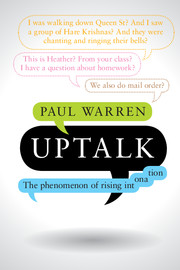Book contents
- Frontmatter
- Dedication
- Contents
- List of figures
- List of tables
- Preface
- Acknowledgements
- List of symbols and abbreviations
- 1 Introduction – why ‘uptalk’?
- 2 The forms of uptalk
- 3 The meanings and functions of uptalk
- 4 Uptalk in English varieties
- 5 Origins and spread of uptalk
- 6 Social and stylistic variation in uptalk use
- 7 Credibility killer and conversational anthrax: uptalk in the media
- 8 Perception studies of uptalk
- 9 Uptalk in other languages
- 10 Methodology in uptalk research
- 11 Summary and prospect
- References
- Index
7 - Credibility killer and conversational anthrax: uptalk in the media
Published online by Cambridge University Press: 05 December 2015
- Frontmatter
- Dedication
- Contents
- List of figures
- List of tables
- Preface
- Acknowledgements
- List of symbols and abbreviations
- 1 Introduction – why ‘uptalk’?
- 2 The forms of uptalk
- 3 The meanings and functions of uptalk
- 4 Uptalk in English varieties
- 5 Origins and spread of uptalk
- 6 Social and stylistic variation in uptalk use
- 7 Credibility killer and conversational anthrax: uptalk in the media
- 8 Perception studies of uptalk
- 9 Uptalk in other languages
- 10 Methodology in uptalk research
- 11 Summary and prospect
- References
- Index
Summary
‘Uptalk’ has been commented on in the popular press for quite some time, and journalists periodically return to it as a significant phenomenon in society (for recent examples see BBC News Magazine, 2014; MailOnline, 2014; Stokel-Walker, 2014). In this chapter I present a survey of English-language media items over a 20-year period (1992–2012) that include some mention or discussion of uptalk under one or other of the labels discussed in Chapter 1. This survey is based primarily on sources available via online search engines and library resources, and is unlikely to be comprehensive; hopefully it is representative.
The sample consists of 183 items, of which approximately half (88) use the term ‘uptalk’, with another 52 preferring ‘upspeak’, along with 21 using ‘HRT/high-rising terminal’, nine using ‘AQI/Australian Question(ing) Intonation’, and a small selection of other terms. Of the 183 items, only 42 cited experts (although the expertise covered a range that included phoneticians, linguists, speech therapists and speaking coaches). A (somewhat subjective) categorisation of the stance taken by the items showed that a little over half of them were neutral, but a sizeable minority (78) were clearly negative or condemning of uptalk. A negative approach was much more likely for items where the use of the intonation pattern itself was the central topic, compared to when it contributed more marginally to the discussion, for example, as just one of many behavioural characteristics of a certain individual or group.
Around half of the pieces made mention of speaker age, with discussion of uptalk predominantly in articles about young adults or teenagers. If speaker sex was mentioned, then it was almost always to indicate that uptalk was a typical female trait. Less than a third of the sample made any type of reference to any geographic origin or centre of influence for the phenomenon, and these were fairly evenly split between the Antipodes (mainly in British articles) and the West Coast of the United States (mainly in American articles). Thirty-nine items commented on whether uptalk was spreading or not – only four of these suggested that it was on the way out. The types of media pieces in the survey sample included opinions, letters, advice columns, profiles and reviews, as discussed in the sections below.
Media reports on uptalk, especially opinion texts, show many of the characteristics discussed in studies of language ideology (e.g., Irvine and Gal, 2000; Lippi-Green, 2012).
- Type
- Chapter
- Information
- UptalkThe Phenomenon of Rising Intonation, pp. 129 - 149Publisher: Cambridge University PressPrint publication year: 2016



